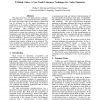Free Online Productivity Tools
i2Speak
i2Symbol
i2OCR
iTex2Img
iWeb2Print
iWeb2Shot
i2Type
iPdf2Split
iPdf2Merge
i2Bopomofo
i2Arabic
i2Style
i2Image
i2PDF
iLatex2Rtf
Sci2ools
VTS
1999
IEEE
1999
IEEE
PADded Cache: A New Fault-Tolerance Technique for Cache Memories
This paper presents a new fault-tolerance technique for cache memories. Current fault-tolerance techniques for caches are limited either by the number of faults that can be tolerated or by the rapid degradation of performance as the number of faults increases. In this paper, we present a new technique that overcomes these two problems. This technique uses a special Programmable Address Decoder (PAD) to disable faulty blocks and to re-map their references to healthy blocks. Simulation results show that the performance degradation of direct-mapped caches with PAD is smaller than the previous techniques. However, for set-associative caches, the overhead of PAD is primarily advantageous if a relatively large number of faults is to be tolerated. The area overhead was estimated at about 10% of the overall cache area for a hypothetical design and is expected to be less for actual designs. The access time overhead is negligible.
| Added | 04 Aug 2010 |
| Updated | 04 Aug 2010 |
| Type | Conference |
| Year | 1999 |
| Where | VTS |
| Authors | Philip P. Shirvani, Edward J. McCluskey |
Comments (0)

